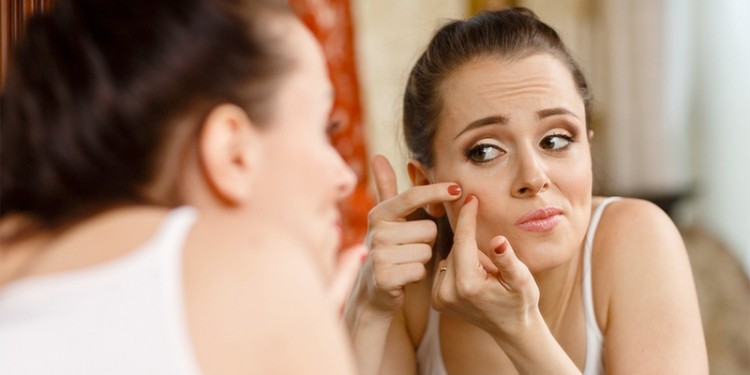How Diet Impacts Your Skin, Hair, Nails (AND Can Help Your Chances of Preventing Skin Cancer)

In the last few years, our culture has become very focused on diet and its role in wellness. Not surprisingly, diet can have an impact on the health of your skin as well. Of course eating well and getting plenty of rest are good for your body, but beyond that, what role does nutrition play in skin health? Spoiler alert… I’m not going to tell you to become gluten-free in this blog, but I will discuss both some easy, and difficult (chocolate), dietary changes you can make to potentially improve the health of your skin.
If you’re like me, you wish there was a DeLorean with a flux capacitor that could whisk you back at least 20 years so you would not tan your skin until it was burnt sienna. In particular, I regret those jaunts to the tanning bed in college, complete with “Hot Butter Action” tan accelerator, but I digress.
Protecting Your (Already Damaged) Skin
So you are reformed, and you always wear sunscreen, but you fear one of these days, a skin cancer is going to find its way to your face. You should make friends with green tea. Green tea polyphenols (GTPs) or catechins are the protective agents. These antioxidants help prevent DNA damage from ultraviolet radiation, but they also help repair DNA damage1. Additionally, GTPs can prevent the progression of a little DNA damage into the development of skin cancer, and they block the immune suppression that can allow cancers to progress(1). A cream with good penetration of the epidermis would work better, but 5-6 cups of green tea would have enough GTPs to provide these chemopreventive benefits(1).
GTPs can also be found in supplements if taking a pill is more your speed.
Cream made with green tea extract has also been shown to improve rosacea (2), an acne-like condition that can cause both pimples and facial redness and flushing. Additionally, sun exposure is a major trigger of rosacea flares, so since GTPs help mitigate the effects of ultraviolet radiation on the skin, drinking green tea might benefit people with rosacea by reducing flares caused by the sun. Finally, a study in mice demonstrated that GTPs may prevent cosmetic signs of skin aging, including discoloration, roughness, and sagging (3).
So let’s say you aren’t the Zen type; what about coffee? There are some studies that indicate coffee may reduce the risk of both melanoma (4), the most commonly deadly form of skin cancer, as well as basal cell carcinoma (5), the most common cancer.
Smaller benefit was seen with black tea, colas, and chocolate, but not decaf, so it appears that caffeine is the helpful agent here. Another common breakfast food/drink, citrus, may actually increase the risk of developing melanoma.
In the Harvard nurses’ health study and the Health professionals’ follow-up study, which followed subjects from the mid 1980s-2010, a correlation was seen between high citrus consumption and risk of melanoma. Drinking more than one glass of OJ a day or eating more than three grapefruits per week was associated with an increased risk of melanoma (6). This data is pretty controversial because it’s correlational data. However, citrus fruit, contains psoralen, a chemical that sensitizes the skin to ultraviolet light. Grapefruit has the highest concentration of psoralen, and grapefruit consumption was more highly correlated with melanoma than other citrus. So there is a physiological explanation for why citrus would increase the risk of melanoma, but that doesn’t mean that it actually does.
Clear as mud? Citrus does have a lot of other health benefits and the risks in terms of skin cancer are unclear. At this point, go ahead and drink your OJ, but maybe don’t put that lime in your corona on the beach.
Back to supplements… niacinamide (aka nicotinamide) made big news in 2015 for decreasing the numbers of new skin cancers and pre-cancers in patients with a history of at least two prior non-melanoma skin cancers (7). These results cannot be generalized to patients with no history of skin cancer, but the results were pretty compelling. Additionally, nicotinamide is cheap, and it has almost no drug interactions. Nicotinamide is a version of niacin (vitamin B3), and B vitamins are water soluble, which means your body doesn’t store extra. If you take too much, you will excrete the excess in your urine. So although the science isn’t there to prove that it will prevent skin cancer in people with no history, it’s low risk and cheap, so if it might work, why not?For my patients that have had two or more skin cancers, I definitely recommend it.
Fish oil is another dietary supplement that may reduce the risk of skin cancer. Four grams of omega-3 fatty acids (equivalent to one and 1/2 servings of oily fish) daily appears to reduce the immune suppression in the skin that results from ultraviolet exposure by about 50% (8). The immune system plays an important role in cancer surveillance. You can get these fatty acids from your diet, but that’s a lot of sardines, so a fish oil supplement is probably easier. Unfortunately, the pills still make your burps smell like fish.
Breaking Hair, Brittle Nails
Hair and nail complaints are very common in dermatology clinics. Almost everyone who comes in with a hair or nail problem is already on a biotin supplement. The health and beauty industries tout biotin (vitamin B 7) as a cure-all for hair and nail complaints. These recommendations are based on the fact that a biotin deficiency can cause brittle hair and nails. However just because you have brittle hair and nails, that does not necessarily mean you have a biotin deficiency.
Biotin deficiency is very uncommon, particularly if you don’t eat a lot of raw egg whites. There are two small studies that demonstrated a benefit in nail thickness in some women who took biotin supplements (9,10), but no studies have been done to compare just taking a multivitamin that contains biotin with a separate vitamin supplement. No studies have demonstrated a benefit to hair from taking a biotin supplement.
Fortunately biotin is a water-soluble vitamin, so it would be difficult to hurt yourself by taking it. If your nails are brittle, biotin is a reasonable thing to try, but for brittle hair or hair loss, save your money. Brittle hair and nails can also be the result of other metabolic disorders (thyroid disease in particular), hair and nail care practices, and also just normal aging. If you are concerned about your hair and nails, a dermatologist can evaluate your for an underlying metabolic or systemic disorder.
Diet and Your (adult) Acne
There is a lot of traditional wisdom about the role diet plays in acne, and I spent the first several years of my career telling people to ignore granny’s advice and just use their acne medicine. However, the role of diet in acne is being investigated again, and some evidence of diet affecting acne has been published. A study in Korea did find that patients with acne that ate a lower glycemic index diet had significantly fewer acne lesions than the acne patients randomized to the high glycemic index diet (11). Eating less refined sugar and processed foods, and more lean protein and veggies may help acne. There is also lot of talk about dairy worsening acne.
No studies have proven a causal link for dairy and acne, but it’s being investigated. So you don’t have to go gluten-free to fix your acne, but you could consider paleo.
Now the big one… chocolate. There has been a study that has linked cocoa consumption with an increase in both inflammatory and non-inflammatory lesion count, and the severity of the increase was tied to the amount of cocoa consumed (12). It appears that the cocoa in chocolate is the problem, so darker chocolate would be worse than milk chocolate from a cocoa standpoint, but milk chocolate has more sugar, so it’s bad from a glycemic index standpoint. The results of this study were pretty impressive, but the study had some limitations, including a small sample size. Additionally, the study participants had mild acne, so we can’t assume that people with moderate or severe acne would see the same dramatic increase in acne lesions with chocolate consumption. The most dramatic effect on acne was seen between 4-7 days; keep that in mind when you are planning your next chocolate binge.
So do I recommend dietary changes to my acne patients? It depends, but not usually. Most patients with acne that is significant enough to be at a dermatologist’s office need treatment. Their acne is not going completely resolve with dietary modifications, even if they were willing to do so. So why give up delicious cheese and chocolate if you would still need to use medicines anyway? Better living through chemistry I always say.
Now, I do have a subset of patients with occasional, mild acne who are anti-medicine generally (read: kombucha-drinking, hemp clothes-wearing women in their 30s and 40s). They get two pimples a month, and they say, “Do you have anything natural?” For these patients, I review the limited data about diet and acne. But for people with real, clinical acne, they need medicine. I try not to ask patients to do things I would not do myself; I have acne, and you would have to pry my acne medicine and my wheel of brie out of my cold, dead hands.
There is definitely a place for nutrition in the treatment and prevention of skin disease, but how important of a role diet plays has yet to be determined. I plan to let the smarty-pants researchers puzzle it out, and in the meantime, I’ll think of about drinking more green tea while I am enjoying my brie wheel.
Sources:
1.Katiyar SK. Green tea prevents non-melanoma skin cancer by enhancing DNA repair. Arch Biochem Biophys 2011 Apr 15; 508(2): 152-158.
2. Syed T, et al. Management of papulopustular rosacea with 2% polyphenone (green tea extract) in a hydrophilic cream: a placebo controlled double-blind study. J Am Acad Dermatol 2005. 52(3); 5.
3. Rutter, K., Sell, D.R., Fraser, N., Obrenovich, M., Zito, M., Starke-Reed, P. et al. Green tea extract suppresses the age-related increase in collagen crosslinking and fluorescent products in C57BL/6 mice. Int J Vitam Nutr Res. 2003; 73: 453–460
4. Loftfield E, Freedman ND, Graubard BI, Hollenbeck AR, Shebl FM, Mayne ST, Sinha R. Coffee drinking and cutaneous melanoma risk in the NIH-AARP Diet and Health study. J Natl Cancer Inst, 2015, 1-9/
5. Song F, Qureshi AA, Han J. Increased caffeine intake is associated with reduced risk of basal cell carcinoma of the skin. Cancer Res July 2012. 72; 3282.
6. Wu S, Han J, Feskanich D, Cho E, Stampfer MJ, Willett WC, Qureshi AA. Melanoma: Citrus Consumption and Risk of Cutaneous Malignant Melanoma. JCO.2014.57.4111; published online on June 29, 2015.
7. Chen AC, et al. A Phase 3 Randomized Trial of Nicotinamide for Skin-Cancer Chemoprevention. N Engl J Med 2015; 373:1618-1626.
8. Pilkington SM, Massey KA, Bennett SP, et al. Randomized controlled trial of oral omega-3 PUFA in solar-simulated radiation-induced suppression of human cutaneous immune responses. Am J Clin Nutr 2013; 97 (3): 646.
9. Hochman LG, Scher RK, Meyerson MS. Brittle nails: response to daily biotin supplementation. Cutis. 1993 Apr;51(4):303-5.
10. Colombo VE, Gerber F, Bronhofer M, Floersheim GL. Treatment of brittle fingernails and onychoschizia with biotin: scanning electron microscopy. J Am Acad Dermatol. 1990 Dec;23(6 Pt 1):1127-32.
11. Kwon HH, Yoon JY, Hong JS, Jung JY, Park MS, Suh DH. Clinical and Histological Effect of a Low Glycaemic Load Diet in Treatment of Acne Vulgaris in Korean Patients: A Randomized, Controlled Trial. Acta Derm Venereol 2012; 92: 241–246.
12. Caperton C, Block S, Viera M, Keri J, Berman B. Double-blind, Placebo-controlled Study Assessing the Effect of Chocolate Consumption in Subjects with a History of Acne Vulgaris. The Journal of Clinical and Aesthetic Dermatology. 2014;7(5):19-23.



